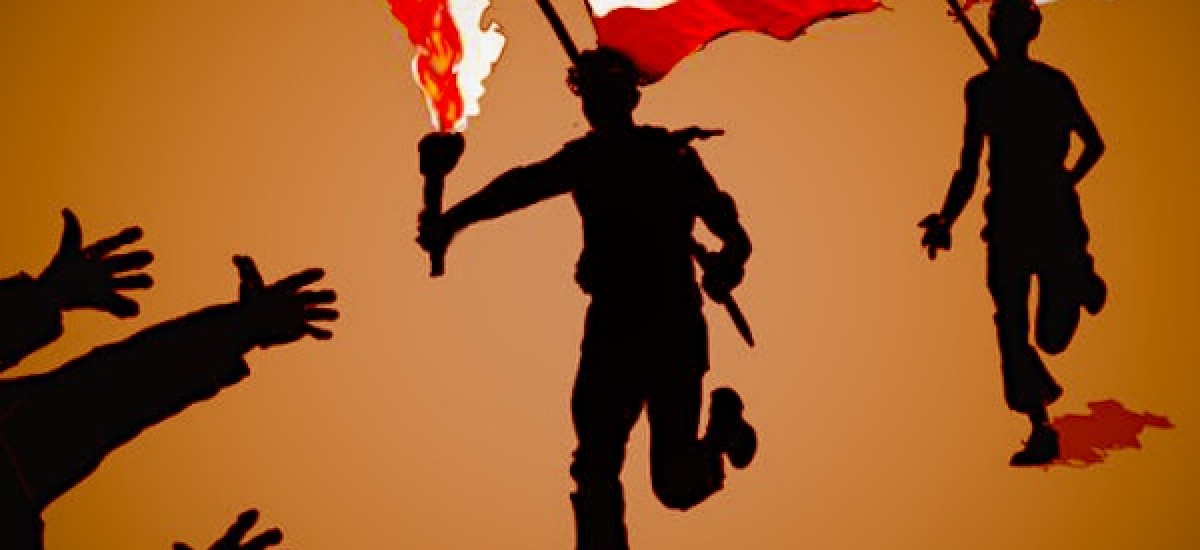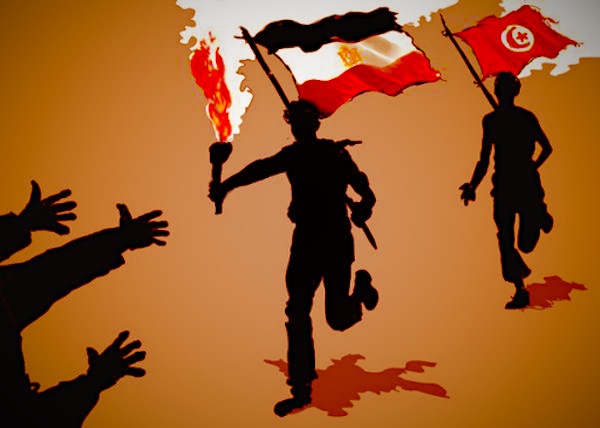Image courtesy New Security Beat
A regime change takes place only if the majority of people in a country want a change. In Sri Lanka today not many people would want it. After 30 years of war and terror, people are able to get about without fear, safe in the knowledge that the LTTE has been annihilated. It is this regime, the Rajapakse regime that made it possible and so the sense of gratitude is very strong among the people. It is this feeling that makes the people vote for the Rajapaksas time and time again. All other feelings of frustration simply evaporate, when they remember the bomb explosions of the past in contrast to the peace and security they enjoy today.
There is also no opposition waiting in the wings to take over power. Slowly but steadily a merger is taking place before our very eyes, in parliament. The UNP which is still the largest opposition party has more or less merged with the UPFA, disregarding the voters who sent them to parliament to oppose the same UPFA government! The UNP leader Ranil Wickramasinghe is now safe in the arms of President Mahida Rajapaksa, bound to enjoy eternal bliss as the permanent leader of the opposition, to prevent it from bringing about a regime change. Ranil Wikramasinghe is today hated by many of the UNP supporters who don’t even bother to vote at elections. But he clings to his position supported by the government and the president. Together they will not allow a regime change. After the recent election of the UNP leaders as a newspaper columnist has said, “The UNP lost, Ranil won and Mahinda Rajapaksa got his Christmas gift!”
The other opposition party, the JVP has been divided and sub-divided so many times that it cannot raise its head again. People do not vote for that party because they cannot forgive or forget the atrocities committed by its members in the late 1980s although Wimal Weerawansa, one of its leading active members during that period is today a popular cabinet minister, close to the president. The JVP that moved away from the government is so helpless today that it has to appeal to the “hated” international community to secure the release of its Jaffna district organizer Lalith Kumar and Kugan Muruganandan who were abducted by an unidentified gang of armed men on December 9th, while organizing a rally in Jaffna. This incident is blamed on the government. In short the JVP cannot initiate a regime change.
This regime is being criticized by the UN and the international community for not investigating war crimes and for the many abductions and disappearances that happened then and continue even today. But a majority of Sri Lankans, other than those in the North and East do not want the Western powers to interfere in our internal affairs. They feel we need to protect our president from these ‘international vultures’’. These ‘vultures’ include America, the western countries and the UN. “If the leaders of these countries could ignore the UN and bomb countries beyond their borders, with impunity killing so many civilians, what moral right do they have to question us?” they ask. “Our president bombed only our own ‘Terrorists’, may be killing some civilians in the process. These civilians could have included women and children but they were all LTTE supporters or sympathizers”. Stretching this point further they could even ask, (as Kumar David puts it) “Americans, British and various colonials have a criminal record of human rights violations, so what’s wrong if we enjoy our share of war crimes?’ we can also tell those who accuse us , “He that is without sin among you, let him first cast a stone” and there will be no one, as it happened in the case of the accusers of the woman brought before Jesus Christ. With such strong popular support, this regime will continue for a very long time.
There are some who do not brand all Tamils as Tiger supporters or sympathizers and realise that thousands of Tamil civilians may have perished in the last battle. But even they do not blame the regime or support an investigation of its war crimes. They argue that neither we nor Banki Moon and his UN, nor the international community, nor our big neighbor India made a serious attempt to stop the killings. We allowed it to happen because all of us wanted an end to the 30 year war. Today all of us enjoy the benefits of that massacre on the shores of Nandikadal. It is that final battle where thousands of civilians (along with LTTE carders) died (according to some international sources) that brought us this peace. Today if we are free to travel to any part of the country without fear, it is this regime that made it possible. As we are all responsible for the war we have no right to point a finger at the regime or demand a regime change.
Those civilians mostly in the North and East would want a regime change hoping that could lead to war crimes investigations. Parents affected by the war want to know whether their children are dead or being held in a torture camp. They have to know the truth however devastating it maybe before they can forgive and forget. It’s only after the truth is revealed and they come to terms with it, can reconciliation begin. The regime seems to believe that reconciliation can be achieved by hiding the truth and promoting economic development. Since the present regime will never reveal the truth, or release the former army commander who could explain what actually took place during the last days of the war, the only option left for these long suffering people seems a regime change. Only when the government is headed by those who had nothing to do with the war will the truth be known.
Victims of Human Rights violations, like the families of all those who have disappeared like Eknelogoda or killed in broad day light like Lasantha and Raviraj or the hundreds who have been abducted over the years by unknown armed gangs in white vans also want a regime change. They realise that there is a close link between crime and political power today. Not only politicians but persons even remotely connected to them feel that the laws of the country do not apply to them. They can shoot and kill an ‘enemy’ or a rival in the presence of hundreds of people in the street and get the CID to ‘prove’ that it was the dead man who fired the first shot. The killer can be proved innocent and the victim the villain. Out of the hundreds who witnessed the killing not one will come forward to tell the truth. Fear would seal their lips. This blatant abuse of power and distortion of justice cannot continue, this regime must change, they say.
Those who seek lasting peace and stability also look forward to a regime that would sincerely implement a political solution, granting devolution of power specially to the North and East. They feel that only if such a political solution is offered can we expect the war affected minorities not to conspire against the state and plan another insurgency, wreaking terror. They do not believe in the “elephant analogy” which is as follows: “compared to us human beings the elephants are a very small number and we could easily kill them all and grab their traditional territory, so with Tamils who are a very small minority among us”. They believe that disgruntled neighbours, even if they are small in number are always a threat to peace and stability. It is better to remove their grievances rather than kill them all, as we are Buddhists who do not suffer from the Mahawansa mindset “where arahants refer to Damilas who were not Buddhists (in King Elara’s army) as not more to be esteemed than beasts whose slaughter need not be lamented”. For the sake of peace and stability this group would welcome a regime change.
When the president had asked Mano Ganesan (leader of the Democratic People’s Front) recently to advise the TNA to come back for talks, so that a solution could be found, Ganesan is reported to have pointed out that since the president enjoys the largest support base among the Sinhalese, he could easily bring in a solution that would not be opposed by the Sinhalese majority. That seems to be the truth. What is obvious then is that the president himself is not interested in a political solution. Now that the LTTE has been eliminated he does not see the need for any other solution. The military solution has been very successful. Therefore whatever solutions are offered to him he simply discards, including his own APRC Expert Panel Report. Now, the next commission appointed by the president, the LLRC has submitted its report to him after 17 months of toil. The commission takes the view that the root causes of the ethnic conflict lie in the failure of successive governments to address the genuine grievances of the Tamil people and a political solution based on devolution is imperative for lasting peace. These recommendations will not please the president and the LLRC report may join the APRC report in the president’s dustbin!
As to the questions, “will there ever be a ‘Tahrir square’ in Sri Lanka?” the best answer is provided by Kawshalya (Daily Mirror December 28th 2011). Commenting on a massive crowd that stood in an unbroken line from Kotte to the Vihara Mahadevi park to cheer and support the demonic 18th Amendment of which they knew nothing she says “Their ignorance could have been pardoned had not they willingly or otherwise become the actors of a farce staged and scripted by the politicians who showed the world the magnitude of our political illiteracy”. We choose to be illiterate and not read the clear writing on the wall. Tahrir square is not for us.
And yet there are a few flickers of hope now and then, like a sane statement from the Friday forum with Jayanta Dhanapala and also sporadic demonstrations against acts of injustice, like the demonstration over the Habaraduwa OIC’s transfer. Here the people have protested against a powerful politician trying to punish an honest police officer for arresting all criminals irrespective of who they were. If more people come forward to fight corruption, injustice and the abuse of power, there may be some hope of a regime change, but what is more likely to happen is that this regime will continue merrily to go down the primrose path taking the country along with it.


